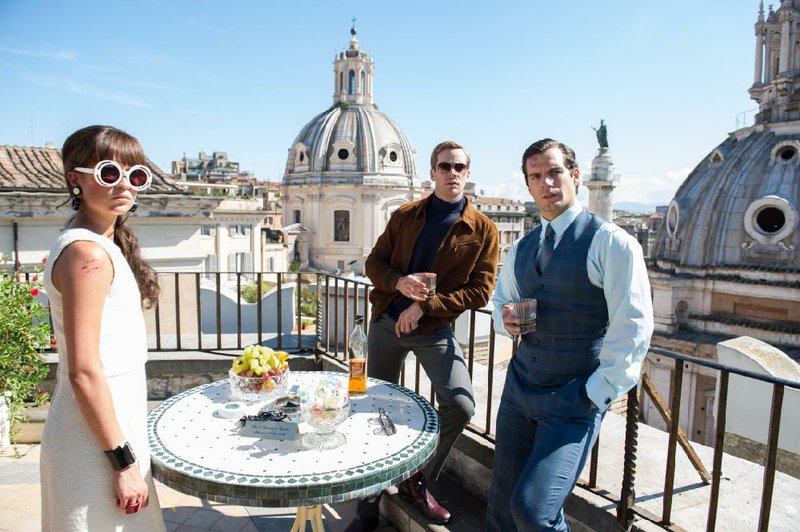For a mid-August movie, Guy Ritchie's retooling of The Man From U.N.C.L.E. isn't that bad, if you go in with minimal expectations and only a fleeting awareness of the mid-1960s NBC television series from which it borrows its title, lead character names and early '60s setting.
Still, for me and a significant if write-offable segment of moviegoers who remember not only the series but the actual Cold War, it is likely to produce some odd feelings. Mostly, I guess, it just makes me feel old.
The Man From U.N.C.L.E.
79 Cast: Henry Cavill, Armie Hammer, Alicia Vikander, Elizabeth Debicki, Luca Calvani, Sylvester Groth, Hugh Grant, Jared Harris
Director: Guy Ritchie
Rating: PG-13, for action violence, some suggestive content and partial nudity
Running time: 116 minutes
The Man From U.N.C.L.E. was one of the first TV programs I actively engaged -- like almost everyone else, I preferred the enigmatic Russian Illya Kuryakin (played by Scottish actor David McCallum) to the putative protagonist Napoleon Solo (Robert Vaughn), an American clone of James Bond. (The relationship between Bond and Solo was genetic; they shared a creator, Ian Fleming, who meant Solo to be a TV-friendly version of Bond. Both were hyper-competent serial womanizers, but Solo was less brutal and more gallant -- a nicer Bond. Tellingly, Fleming initially imagined him as Canadian.)
British actor Henry Cavill (the current Superman) plays Solo here, and while he is nominally American, he presents more as British or a mid-Atlantic, a sort of denatured Cary Grant (who never played Bond, although he was offered the role in Dr. No). Cavill pneumatically fills out his bespoke suits, hits his marks and articulates the dialogue, but never manages to convey a sense of the spy's interior. As if in compensation, Ritchie and co-writer Lionel Wigram graft onto the character a criminal back story -- Solo is, like the character Robert Wagner played in another '60s television series, It Takes a Thief, a crook who works for the U.S. government to stay out of prison.
Kuryakin is played by Armie Hammer, in what might seem to be an inspired bit of counterintuitive casting. Like his TV counterpart, Kuryakin is mostly reserved and intellectual. But while I remember (perhaps incorrectly) McCallum's Kuryakin as preternaturally calm and physically unimposing (I think he was a gymnast), in this film he's an athletic specimen who, pushed past his limits, is susceptible to berserking. Illya smash.
The Solo-Kuryakin relationship follows the predictable path of most romantic comedy couples. They meet cute and immediately try to kill each other. Throughout the movie they bicker and bond. By the end of the movie, they're willing to compromise their country's interest for each other. It's sweet, really -- what's geopolitics between buddies?
Not that women are completely absent -- the convoluted plot involves an East German auto mechanic named Gaby (played by Alicia Vikander, who strangely fails to make much of an impression), whom Solo brings to the West in order to track down her father, Hitler's favorite rocket scientist, who has recently disappeared from the United States. Now he's believed to be working for the same louche Italian family (headed by Elizabeth Debicki, who looks like Paris Hilton's sophisticated older sister) that employs Gaby's uncle, a Josef Mengele-style Nazi war criminal played with shameless delight by Sylvester Groth.
You can see what the would-be subversive Ritchie is getting at in a scene set in a couture showroom where the two macho spies argue about whether the fiance of a Russian architect would wear Paco Rabanne or Jean Patou or when they divide up the lock-picking workload on a heavy steel door. Yet there's as little chemistry between Hammer and Cavill as there is between Kuryakin and his pretend-wife Gaby.
And Ritchie's signature freneticism is toned down to the point of plodding. We register the European locations and the retro styles, but there's a curious lack of kick in the film. What should have been a signature set piece -- Solo enjoying a nice Chianti and sandwich as Kuryakin pilots a burning speedboat in the background -- comes across as an overly long and mannered joke that lacks the rude, shocking power of similar transpositions in Ritchie's tough, Tarantino-esque early films Lock, Stock & Two Smoking Barrels and Snatch.
It's a professional job, and nobody does themselves much dishonor (Cavill isn't Grant or even Rock Hudson, but he's not a stiff either; Hammer and Vikander have been better elsewhere) and The Man From U.N.C.L.E. is likely to be received by moviegoers younger than I as of a piece with the director's post-Swept Away oeuvre -- loud and buzzy and testosterone-soaked. It's the sort of thing that we recognize as a spy movie, with the familiar rhythms of reversal and betrayal -- it twists when we expect it to, and resolves neatly, teasing viewers with the prospect of a sequel.
It's bland enough to be received by a global audience, but probably a touch too slick to gain any real purchase on the collective imagination. Even as I was leaving the theater, I felt the film evaporating off me, like so many IQ points.
MovieStyle on 08/14/2015

